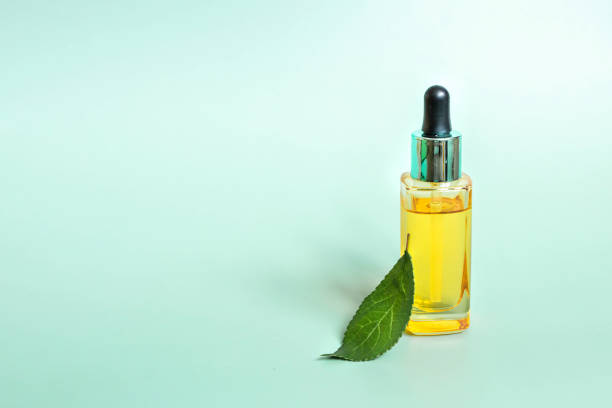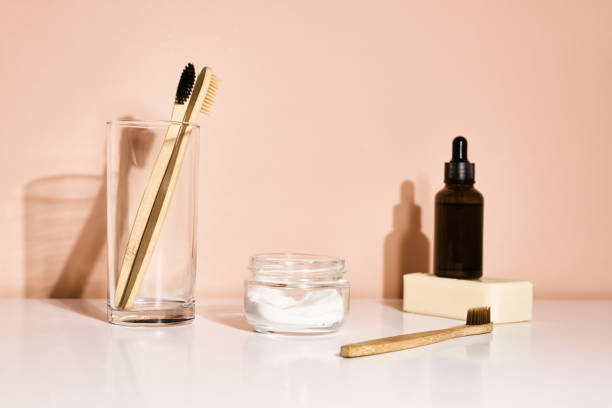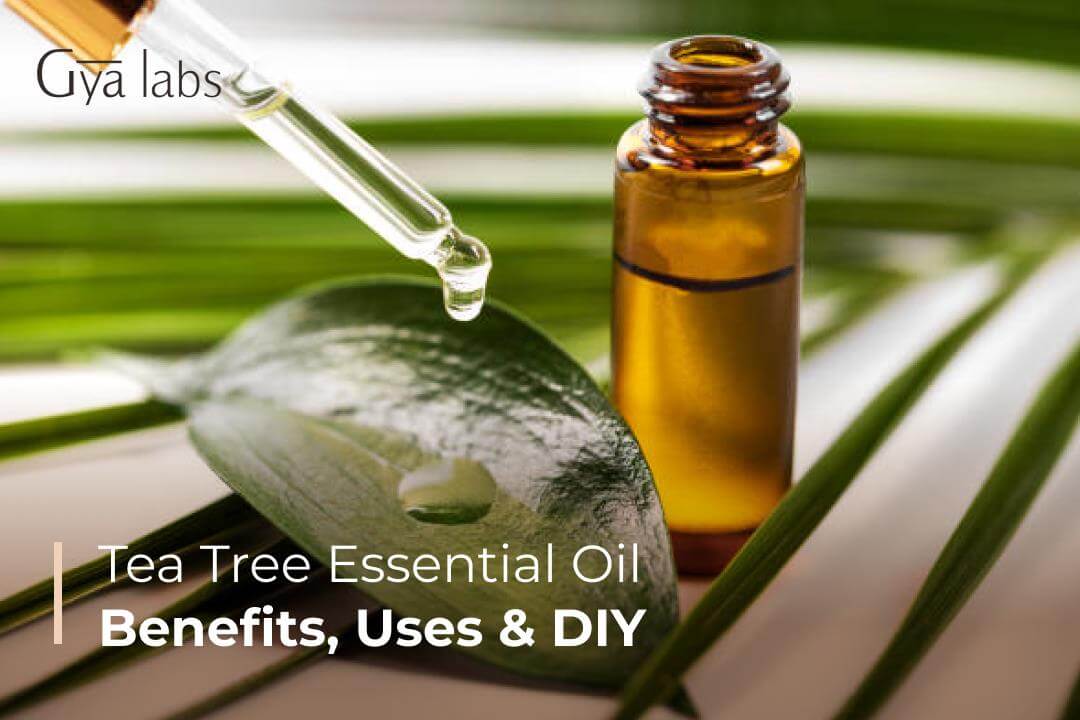Overview
Tea tree oil is one of the most famous and commonly used essential oils. It has numerous benefits and has many different properties that promote health and wellness. Tea tree oil is extracted from the Melaleuca alternifolia tree that is native to Australia. It is also called melaleuca oil. Essential oils are plant extracts and are safe and natural options that can be used for different purposes.
Tea tree oil has exceptional properties like antibacterial, antiseptic, antiviral, anti-inflammatory, antimicrobial, etc. It also contains many different chemical compositions, like terpinene-4-ol, cineole, and alpha-terpineol (1). These compositions have both medicinal and therapeutic properties. It can be used in the form of alternative treatments for different health conditions.

Tea tree oil has gained wide relevance mainly because of its use and benefit in the field of skin care and hair care. This is a complete guide to tea tree oil that discusses in detail the uses and benefits of tea tree oil. Also, some DIY recipes are also included in the end, which you can try at your home to use tea tree oil in different ways.
What are the Benefits of Tea Tree Oil?
The following are some of the tea tree oil benefits:
1. Antibacterial Properties
Research suggests that tea tree oil has antibacterial properties that help in treating as well as restricting bacterial growth. It helps treat skin infections (2). Tea tree oil’s antimicrobial properties help in treating acne and cleanse the skin. It also restricts future breakouts. It has the ability to treat skin conditions like eczema, psoriasis, etc.
With its potent and natural ability to combat fungal infections, Tea Tree Oil has been widely known as one of the best essential oil for ringworm. Incorporating this essential oil into your skincare routine may help alleviate the symptoms and promote healing for this common fungal condition.
2. Antifungal Properties
Athletes’ foot, and yeast infections don’t stand a chance against tea tree essential oil. Its potent antifungal properties help eliminate fungal growth and restore the health of the affected areas. The antifungal properties help soothe skin (3).
It also deeply cleanses and purifies the skin and makes sure that no fungal growth takes place on the skin. Its antifungal properties can also treat athlete’s foot and ringworm. It reduces the redness and itchiness of the skin. Tea tree oil is recommended for treating nail fungus due to its antifungal properties, which can help combat the infection and promote healthier nails.
3. Boosts Immunity
Oils like tea tree oil can boost your immune system and help get rid of illnesses. Its ability to stimulate the production of white blood cells strengthens the body’s defense mechanisms and enhances your overall wellbeing. The antibacterial, antifungal, and antimicrobial properties of tea tree oil help in combating pathogens and thus boost your immunity.
4. Improves Respiratory Functioning
Inhaling tea tree oil can provide respiratory benefits, particularly in cases of congestion, coughs, and colds. Its properties help clear the airways, promoting easier breathing and relieving discomfort. The antimicrobial properties also help in fighting infections, if any, in the respiratory system (4). The study found that tea tree oil help treats sinusitis, bronchitis, etc., and respiratory conditions.
5. Promotes Emotional Wellbeing
One of the activities of tea tree oil is to promote emotional balance and stability. The invigorating scent of tea tree essential oil has a positive impact on your mood. It instantly helps lift your mood. It also boosts your confidence and promotes emotional well-being.
How to Use Tea Tree Oil? | What are the Uses for Tea Tree Oil?
Following are some of the tea tree oil uses:
1. Skincare
Tea tree oil has many benefits for the skin. Tea tree oil is commonly used in skincare products thanks to its ability to cleanse and purify the skin. It helps control excess oil, soothes irritation, and promotes a healthy complexion. Add a few drops of tea tree oil into your daily skincare routine to experience its remarkable effects (5). There are also many skincare products available in the market containing tea tree oil.

2. Haircare
Tea tree oil can be used to promote haircare. Tea Tree essential oil works wonders for maintaining a healthy scalp and lustrous hair (6). By adding a few drops of tea tree oil to your shampoo or conditioner, you can combat dandruff, relieve itchiness, and promote optimal hair growth. You can use tea tree oil for hair and scalp.
3. Oral Health
Tea tree oil has antimicrobial properties. It is an excellent addition to your oral hygiene routine (7). Use it as a natural mouthwash by diluting a few drops in water and gargling to combat bad breath, reduce plaque, and maintain a fresh and clean mouth.

4. Natural Cleaning
Harnessing the disinfectant and antifungal properties of Tea Tree oil, you can create your own DIY cleaning solutions. Mix it with water and vinegar to create an all-purpose cleaner that is not only effective but also free from harsh chemicals. Tea tree oil has properties that help clean dead skin and gives you clear-looking skin.
5. Insect Repellent
Say goodbye to pesky insects with Tea Tree essential oil. Combine a few drops with a carrier oil, such as coconut or jojoba oil, and apply it to exposed areas of your skin to naturally repel bugs and mosquitoes (8).
6. Mold Removal
Tea tree oil and other essential oils that kill mold possess potent antifungal properties. These essential oils that kill mold effectively combat and eliminate mold growth, preventing its spread and associated health risks. Incorporating these natural remedies like tea tree oil and essential oils that kill mold can ensure a mold-free environment.
7. Tea Tree Oil for COPD
Tea tree oil is an essential oil that has been shown to have some benefits for COPD. It has antibacterial and anti-inflammatory properties, which can help to reduce mucus production and inflammation in the lungs.
Tea tree oil can be used in a diffuser or diluted in a carrier oil and applied to the skin. It can also be added to a warm bath or used in a steam inhalation.
As one of highly recommended oil among the other essential oils for COPD, it is believed to possess anti-inflammatory and antimicrobial effects.
8. Instant Relief in Hemorrhoids
Tea tree oil, renowned for its natural healing properties, is gaining popularity as one of the most effective oils for hemorrhoids. Extracted from the leaves of the Melaleuca alternifolia plant, this essential oil possesses anti-inflammatory and antimicrobial qualities that can alleviate discomfort caused by hemorrhoids.
When applied topically, tea tree oil helps reduce swelling, soothes itching, and promotes healing. Incorporating tea tree oil into your hemorrh care routine may provide relief and support the overall well-being of affected areas.
That’s Why Tea tree essential oil is also considered one of the best essential oils for hemorrhoids, tea tree oil decreases inflammation, pain, and irritation when applied topically to inflamed veins.
9. Earaches Antidote
When it comes to finding relief for earaches, many people are turning to the natural power of tea tree oil. This incredible essential oil has gained popularity for its potential benefits in alleviating ear discomfort. Tea tree oil possesses antibacterial and anti-inflammatory properties, making it an appealing choice for addressing earaches naturally. To use tea tree oil for earaches, it’s advisable to dilute a few drops in a carrier oil such as coconut or olive oil. Gently apply the mixture around the outer ear area for relief. Consider tea tree oil as an effective and natural essential oil for earache management.
DIY Recipes Using Tea Tree Essential Oil
# Tea Tree Facial Toner
Ingredients:
- 1/2 cup distilled water
- 1/4 cup witch hazel
- 10 drops of Tea Tree essential oil
Instructions:
- In a small spray bottle, combine the distilled water and witch hazel.
- Add 10 drops of Tea Tree essential oil to the mixture and shake well. Pour this mixture of tea tree oil into a spray bottle.
- After cleansing your face, spritz the toner onto a cotton pad and gently apply it to your skin.
- This toner helps balance the skin’s pH, control excess oil, and reduce blemishes.
*Tea tree oil contains anti-inflammatory properties, antiseptic properties, astringent properties, etc., that help in treating acne, reducing blemishes, and improving skin texture.
# Soothing Tea Tree Bath Salt
Ingredients:
- 1 cup Epsom salt
- 1/4 cup baking soda
- 10 drops of Tea Tree essential oil
- 5 drops Lavender essential oil (optional)
Instructions:
- In a bowl, mix the Epsom salt and baking soda until well combined.
- Add 10 drops of Tea Tree essential oil and 5 drops of Lavender essential oil (optional) to the mixture. Stir thoroughly.
- Pour the bath salt into a jar or container for storage.
- Add a few tablespoons of bath salt to warm running water and enjoy a soothing and cleansing bath experience. Tea Tree oil helps refresh the skin and promote relaxation.
*Tea tree oil is an essential oil that can help relax your body. Adding tea tree oil to your bath will give you a relaxing experience.
# Tea Tree All-Purpose Cleaning Spray
Ingredients:
- 1 cup distilled water
- 1/4 cup white vinegar
- 10 drops of Tea Tree essential oil
- 10 drops of Lemon essential oil (optional)
Instructions:
- Combine the distilled water and white vinegar in a bowl.
- Add tea tree oil to a spray bottle and 10 drops of Lemon essential oil (optional) to the mixture.
- Add the white vinegar and distilled water mixture to the spray bottle.
- Shake well before each use.
- Use this DIY cleaning spray on countertops, sinks, and other surfaces to naturally disinfect and eliminate bacteria. Tea Tree oil’s antifungal properties make it especially effective in tackling mold and mildew.
*Tea tree oil’s ability to kill fungal and bacterial growth helps in cleaning activity.
# Tea Tree Scalp Treatment Oil
Ingredients:
- 2 tablespoons jojoba oil or coconut oil
- 5 drops of Tea Tree essential oil
- 5 drops of Rosemary essential oil
- 5 drops Peppermint essential oil
Instructions:
- Add tea tree oil to a cup along with jojoba oil, rosemary, and peppermint essential oils.
- Mix well to ensure the oils are thoroughly blended.
- Massage the scalp treatment oil into your scalp using your fingertips.
- Leave it on for at least 30 minutes before shampooing your hair.
- This nourishing blend helps promote a healthy scalp, reduces dandruff, and stimulates hair growth.
*You can also create your own tea tree oil shampoo at home.
Precautions and Safety Measures for Potential Side Effects of Tea Tree Oil
Tea tree essential oil is a natural product, is usually safe to use on the skin, and has fewer side effects. But there are always chances of potential side effects of tea tree oil, like skin irritation or can lead to allergic reactions. So, to avoid such skin conditions, it is suggested that tea tree oil should be used in a particular manner and with certain care and attention.
Following are some of the precautionary measures that should be adopted to avoid any negative impact of using tea tree oil and to enjoy the benefits and uses of tea tree oil to its fullest.
- Patch Test: Before using Tea Tree essential oil topically, it’s essential to perform a patch test. Apply a small amount of diluted oil to a small area of the skin and wait 24 hours to check for any adverse reactions or skin sensitivity.
- Dilution: Avoid using tea tree oil directly on the skin. Being a natural oil, the concentration of tea tree oil is very high. Undiluted tea tree oil can cause skin irritation, redness, or inflammation. It is crucial to dilute it with a carrier oil, such as jojoba, coconut, or almond oil, before applying it to the skin. Usually, it is suggested to use a 2% dilution, which means adding 12 drops of tea tree oil to 1 ounce (30 ml) of carrier oil.
- Avoid Eye Contact: Tea tree oil may cause irritation, so make sure it never comes into direct contact with the eyes. If accidental eye contact occurs, rinse the eyes thoroughly with clean water and seek medical attention if irritation persists.
- Pregnancy and Children: Pregnant women and young children should consult with a healthcare professional before using tea tree essential oil, as some individuals may have specific sensitivities or contraindications.
- Oral Use Precautions: Keep in mind that tea tree oil is toxic and may cause adverse effects. Tea tree oil should not be used for internal use. If you require internal use, consult with a qualified aromatherapist or healthcare practitioner.
- Keep Out of Reach of Children: Like any essential oil, Tea Tree oil should be stored in a safe place, out of the reach of children and pets. Accidental ingestion by children can be harmful.
- Quality and Purity: Ensure you purchase Tea Tree essential oil from reputable sources that offer pure, high-quality oils. Look for oils that are steam distilled and free from additives or synthetic fragrances.
- Sensitive Skin: Individuals with sensitive skin should exercise caution when using Tea Tree essential oil. Start with lower dilutions and monitor your skin’s reaction before increasing the concentration.
- Sun Sensitivity: Tea Tree essential oil may increase the skin’s sensitivity to the sun. Avoid direct sunlight or UV exposure for at least 12 hours after applying Tea Tree oil topically.
- Allergies: If you have a known allergy to plants in the Myrtaceae family, such as eucalyptus or clove, exercise caution when using Tea Tree essential oil. Discontinue use if any allergic reactions occur.
Summary
Tea tree oil has been used for ages as a part of traditional medicine as well as in skincare. Tea tree oil may help fight acne and other bacteria and fungal growth and thus improves health and skin. There are many skin conditions that can be treated with tea tree oil. It is one of the best essential oil for ringworm. Tea trees can also be used for treating hair and scalp issues. Combine tea tree oil with your shampoo and conditioner, and see the difference for yourself.
Tea tree oil is generally used in skincare, and there are many different ways to use tea tree oil. Adding two to three drops of tea tree oil to your diffuser will help you enjoy all its benefits. You can use tea tree oil as a natural insect repellant. Tea tree oil may also be used for promoting oral care. Adding two drops of tea tree oil to your toothpaste can change your whole oral care game.
The above article has covered all the major tea tree oil uses and benefits. Always make sure to purchase pure essential oil from an authentic source or a reputable brand to ensure its quality. Also, avoid using tea tree oil directly to the skin without diluting it with any carrier oil.
Frequently Asked Questions
What is tree tea oil good for?
Tea tree oil is rich in properties like antibacterial, antifungal, antimicrobial, antiviral, anti-inflammation, antiseptic, antioxidant, etc. that helps in treating conditions like acne, inflammation, eczema, psoriasis, etc. It cleanses the skin deeply and gives you a clear and glowing skin.
Can you apply tea tree oil directly to skin?
Undiluted tea tree oil is rich in concentration and can cause skin irritation, inflammation, itchiness, or redness. So, it is not recommended to directly apply tea tree oil to the skin. Instead dilute it with any carrier oil before directly applying to the skin.
Can I put tea tree oil on a pimple?
Yes, you can put diluted tea tree oil on a pimple as it contains antibacterial, antifungal, antiseptic, and anti-inflammatory properties that help in treating acne.
Can I mix tea tree oil with moisturizer?
Yes. You can add few drops of tea tree oil with any moisturiser to increase its medicinal and therapeutic value by adding all the properties and nutrients of tea tree oil.
Source:
- River Tea Tree Oil: Composition, Antimicrobial and Antioxidant Activities, and Potential Applications in Agriculture https://www.mdpi.com/2223-7747/10/10/2105
- The mode of antimicrobial action of the essential oil of Melaleuca alternifolia (tea tree oil) https://academic.oup.com/jambio/article-abstract/88/1/170/6721378
- Antifungal activity of the components of Melaleuca alternifolia (tea tree) oil https://academic.oup.com/jambio/article-abstract/95/4/853/6723947
- A review of applications of tea tree oil in dermatology https://onlinelibrary.wiley.com/doi/abs/10.1111/j.1365-4632.2012.05654.x
- Nanolipogel Loaded with Tea Tree Oil for the Management of Burn: GC-MS Analysis, In Vitro and In Vivo Evaluation https://www.mdpi.com/1420-3049/27/19/6143
- Potential use of essential oils in cosmetic and dermatological hair products: A review https://onlinelibrary.wiley.com/doi/abs/10.1111/jocd.14286
- The Influence of Toothpaste Containing Australian Melaleuca alternifolia Oil and Ethanolic Extract of Polish Propolis on Oral Hygiene and Microbiome in Patients Requiring Conservative Procedures. https://www.mdpi.com/1420-3049/22/11/1957
- Australian tea tree (Melaleuca alternifolia) oil poisoning in three purebred cats. https://journals.sagepub.com/doi/pdf/10.1177/104063879801000223
